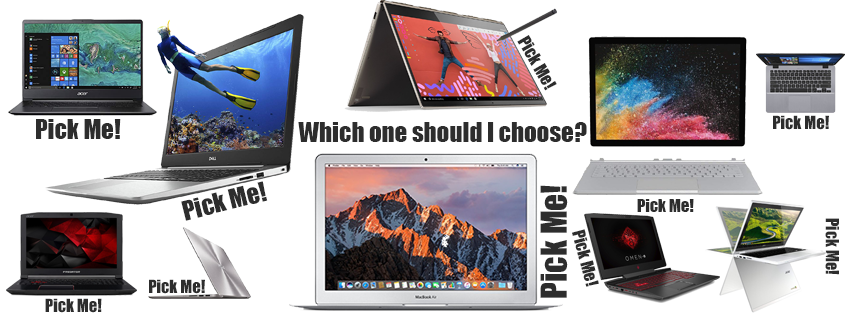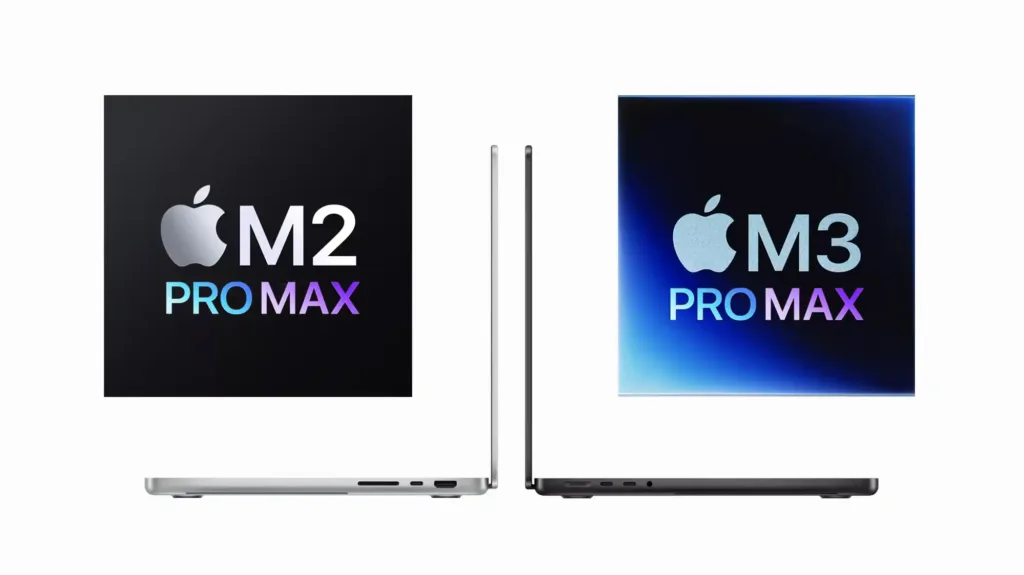
Introduction: The Importance of Choosing the Right Laptop
A laptop is a significant investment, and selecting the right one can significantly impact your productivity and overall computing experience. With a wide range of laptops available, making an informed decision can be daunting. This comprehensive guide will walk you through key factors to consider before buying a laptop, ensuring you find the perfect fit for your needs and budget.
Assessing Your Needs

Identify Your Usage:
How will you primarily use your laptop? Are you a student, a graphic designer, a business professional, a casual user, or a gamer? Understanding your intended purpose will help narrow down your options and focus on laptops designed for your specific tasks.
Consider Portability:
How often will you carry your laptop? If you’re always on the go, consider a lightweight and compact laptop that’s easy to transport. For stationary use, a larger and heavier laptop may be more suitable.
Determine Performance Requirements:
Think about the tasks you’ll perform on your laptop. For basic tasks like web browsing, email, and word processing, a laptop with moderate specifications will suffice. For demanding tasks like video editing, gaming, or programming, invest in a laptop with a powerful processor, plenty of RAM, and a dedicated graphics card.
Evaluate Storage Capacity:
Consider how much storage space you need for your files, software, and multimedia. If you work with large files or store a lot of photos and videos, opt for a laptop with a larger hard drive or solid-state drive (SSD). Some laptops offer the option to expand storage with external drives or cloud services.
Budgeting and Features

Set a Realistic Budget:
Determine how much you’re willing to spend on a laptop. Keep in mind that you don’t always have to spend a fortune to get a good laptop. There are plenty of affordable options available that offer excellent performance and features.
Invest in Essential Features:
Prioritize the features that are truly important for your usage. Consider factors like processor speed, RAM, storage capacity, display quality, and battery life. Don’t get lured by unnecessary features that you won’t use.
Avoid Expensive Extras:
Resist the temptation to overspend on features that you don’t need. Some laptops come with fancy features like touch screens, backlit keyboards, or high-resolution displays, but these often come at a premium price. Choose a laptop that has the features you need without paying extra for bells and whistles.
Ergonomics and Usability
Pay Attention to Comfort:
Consider the laptop’s weight and size. If you’ll be carrying it around a lot, make sure it’s lightweight and easy to carry. Also, pay attention to the keyboard and trackpad. They should be comfortable to use, especially if you’ll be typing or using the trackpad for extended periods.
Think About the Keyboard and Trackpad:
Test out the keyboard and trackpad before buying a laptop. Make sure the keys are well-spaced and have a good travel distance. The trackpad should be responsive and support multi-touch gestures.
Assess the Display Size:
Choose a display size that suits your needs. A too-small display can be frustrating to use, while a too-large display can add weight and reduce portability. Consider your usage and choose a display size that provides a comfortable viewing experience.
Connectivity and Ports
Check the Ports:
Ensure that the laptop has the necessary ports for your peripherals and accessories. Common ports include USB, HDMI, and Ethernet. If you use specialized equipment, make sure the laptop has the appropriate ports to connect them.
Consider Connectivity Options:
Think about the connectivity options you need. Most laptops come with Wi-Fi and Bluetooth, but if you need a wired connection, make sure the laptop has an Ethernet port. Some laptops also offer mobile broadband connectivity, allowing you to connect to the internet even when you’re away from a Wi-Fi network.
Upgradability and Longevity
Choose a Laptop with Upgradability Options:
Consider the laptop’s upgradability options. If you think you’ll need more storage or RAM in the future, choose a laptop that allows you to upgrade these components. This will extend the lifespan of your laptop and save you money in the long run.
Think About the Battery Life:
Consider the laptop’s battery life. If you’ll be using the laptop on the go, make sure it has a long battery life. Look for laptops with at least 8-10 hours of battery life.
Consider the Warranty:
Protect your investment by choosing a laptop with a good warranty. Most laptops come with a one-year warranty, but some manufacturers offer longer warranties. A longer warranty will give you peace of mind knowing that you’re covered in case of any defects or malfunctions.
Research and Reviews
Read Online Reviews:
Gather diverse perspectives by reading online reviews from tech experts and users. Look for reviews that highlight the laptop’s strengths and weaknesses. This will give you a better understanding of the laptop’s performance and any potential issues.
Watch Video Reviews:
Get a detailed demonstration of the laptop by watching video reviews. Tech YouTubers often provide in-depth reviews that cover various aspects of the laptop, including performance, battery life, and display quality.
Consult Trusted Sources:
Seek expert opinions from trusted sources such as technology blogs, magazines, and websites. These sources often provide unbiased reviews and recommendations, helping you make an informed decision.
Brand and Reputation
Research Different Brands:
Compare features and value offered by different laptop brands. Consider brands that are known for their reliability, innovation, and customer support. Read reviews and user experiences to understand the pros and cons of each brand.
Consider User Reviews and Experiences:
Learn from others’ experiences by reading user reviews. Pay attention to common complaints or praises about specific laptop models. This will give you a better idea of the overall user satisfaction with the laptop.
Avoid Blind Brand Loyalty:
Choose what’s best for you, not just because of brand loyalty. Don’t be afraid to explore different brands and models to find the one that suits your needs and budget the best.
Display Quality
Assess the Display Type:
Consider the type of display panel used in the laptop. IPS (In-Plane Switching) panels offer better color accuracy and viewing angles compared to TN (Twisted Nematic) panels. If color accuracy is important for your work, choose a laptop with an IPS display.
Don’t Assume You Need High Resolution:
While high-resolution displays (such as 4K) look amazing, they can also be expensive and impact battery life. Consider your usage and choose a display resolution that provides a sharp and clear image without breaking the bank.
Beware of Glossy Displays:
Glossy displays can be visually appealing, but they can also be frustrating to use in real-life scenarios. Glare and reflections can make it difficult to see the screen, especially in bright environments. Consider using a laptop with a matte display to minimize these issues.
Personalization and Customization
Choose a Customizable Laptop:
Tailor your laptop to your needs by choosing a customizable model. Some laptops allow you to choose the processor, RAM, storage, and display options. This gives you more control over the laptop’s performance and features.
Consider Accessories and Peripherals:
Enhance your laptop experience by considering compatible accessories and peripherals. These may include a mouse, keyboard, external monitor, or carrying case. Choose accessories that complement your laptop and improve your productivity.
Conclusion: Recap and Final Advice
Recap:
Consider Before Buying a Laptop
– Assess your needs: Understand your intended usage and determine the necessary performance, storage, and portability requirements.
– Set a realistic budget: Determine how much you’re willing to spend and prioritize essential features over expensive extras.
– Consider ergonomics: Choose a laptop that’s comfortable to use, with a well-spaced keyboard, responsive trackpad, and suitable display size.
– Check connectivity and ports: Ensure the laptop has the necessary ports and connectivity options for your peripherals and accessories.
– Think about upgradability and longevity: Choose a laptop with upgradability options and a good battery life. Consider the warranty coverage for added peace of mind.
– Research and read reviews: Gather diverse perspectives by reading online reviews, watching video reviews, and consulting trusted sources.
– Consider brand reputation: Research different brands and consider user reviews to understand the overall user satisfaction with specific laptop models.
– Evaluate display quality: Assess the display type, resolution, and glare resistance to ensure a comfortable viewing experience.
– Personalize and customize: Choose a customizable laptop and consider compatible accessories to enhance your productivity and experience.
Final Advice:
Make an Informed Purchase
Before making a final decision, take your time, compare different models, and consider all the factors discussed in this guide. Remember, the best laptop for you is the one that aligns with your specific requirements and usage patterns. By following these considerations, you can make an informed purchase and choose the right laptop that will serve you well for years to come.
The most important factors to consider are your intended usage, budget, performance requirements, storage capacity, and portability. Assess your needs and choose a laptop that meets these criteria.

